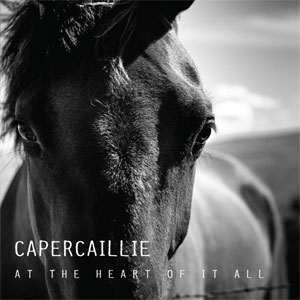 I’m still working my way through Capercaillie, which, out of a host of interesting musicians from many traditions, remains one of the most engaging groups I’ve run across. At the Heart of It All seems to pull together a lot of what I’ve found in their earlier offerings into a very coherent whole.
I’m still working my way through Capercaillie, which, out of a host of interesting musicians from many traditions, remains one of the most engaging groups I’ve run across. At the Heart of It All seems to pull together a lot of what I’ve found in their earlier offerings into a very coherent whole.
The first track, “S’och A’Dhomhnaill Oig Ghaolaich”, gives a good take on what this album is about — still strongly grounded in traditional music, but retaining the influences from other modes we saw in To the Moon. Here, there’s a jazz flavor to the traditional trills and flourishes, largely the result of instrumentation: putting a saxophone in place of a fiddle doesn’t really give a purely traditional flavor to the piece, but it works. It’s followed by “The Strathspey Set,” a more purely traditional-sounding track that serves to set up a nice tension against the first track that carries through the remainder of the collection.
“Ailein Duinn Nach Till Thu An Taoblh-Seo” is another one noted as “trad. arr. Capercaillie” — a ballad in which Karen Matheson’s voice works its usual magic. The fiddle part is about as traditional as it gets, although the whole track is low-key: it’s not a show piece, it’s an ensemble piece, and even though Matheson’s vocals are featured, they don’t stand out in quite that way, if you know what I mean.
The title track could fit easily into a Top 40 line up from almost any time in the past forty years or so – at least, until that fiddle cuts in. Another low-key ballad, the only thing that really marks it as “traditional” (it was written by Donald Shaw) is that very plaintive fiddle – and the pipes.
And then “Abu Chuibl’” takes us right into a kind of fusion – rhythms that could come from almost anywhere, add in trumpet (Ryan Quigley), sax (Paul Towndrow), and trombone (Michael Owers), and yet there’s still a definite taste of Scotland in the mix.
And that outlines the dimensions of the album: “traditional,” yes, but very much of the here and now, as well. I’ve often maintained that tradition is a living thing – if it’s not open to new influences, not able to incorporate new ideas and new ways of expressing old ideas, it becomes merely a curio, gathering dust on a shelf. Capercaillie, in At the Heart of It All, bears me out: very much aware of its roots, but equally, very much part of the larger world.
(Compass Records/Vertical, 2013)
